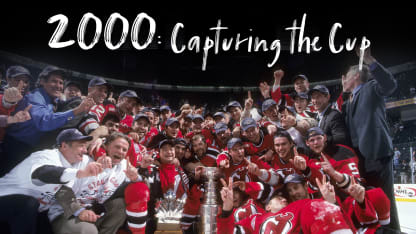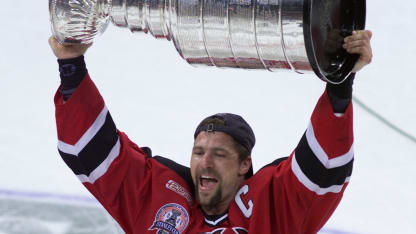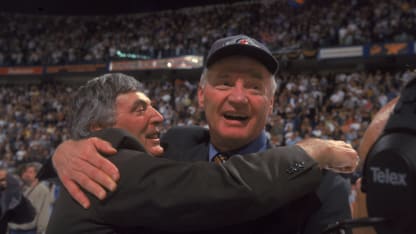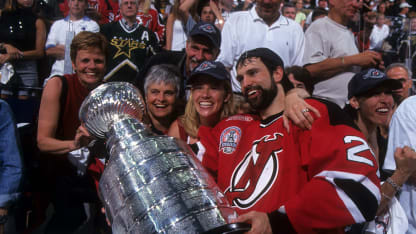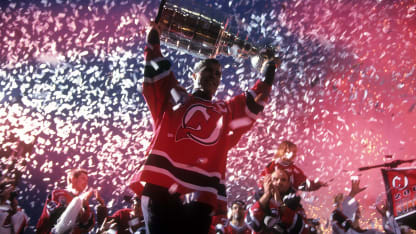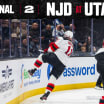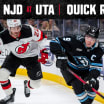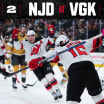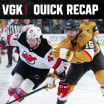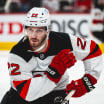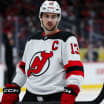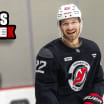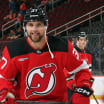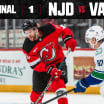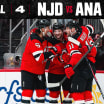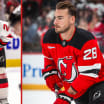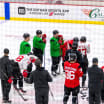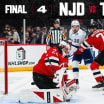Of all the people consulted for this story, much more emphasis was put on the journey to get to the seminal moment, rather than that moment itself. Elias, having set-up Arnott's goal after scoring the winner against Philadelphia, provided the most succinct reaction:
"People are surprised to hear (this) but I was just relieved that it was over and we were able to win."
Arnott's immediate reaction was to buttonhook to his left, narrowly avoiding Gregson who was signaling the winning goal, and then he was mobbed by teammates. But soon after, Arnott too was measured in his words, not because he wasn't happy - he was overjoyed.
But the big center's interview immediately after revealed a reaction like Elias's, excitement mixed with clear relief:
"Everyone just pulled together (in) scoring that winning goal. I don't know how to celebrate right now. I'm too excited," said Arnott in an on-ice interview within minutes of potting the winner.
Gregson had done the decisive Game 6 a year earlier when Brett Hull of the Stars scored the controversial overtime winner.
"You want a quick and clean goal. That's all you want. It wasn't quick but thankfully it was clean."
And so the Cup was won. Two dominating series wins against the Panthers and the Maple Leafs, an incredible comeback over the Flyers and a dramatic overtime winner in the Stanley Cup Final. An incredible 14 one-goal games, just two of which were won in overtime.
John Madden's take was interesting:
"To be honest, I had watched guys like Mike Modano, Eric Lindros, Mats Sundin. Really, not too much different than a regular fan. They were Hall of Famers. Then, all of sudden, I'm playing against them. But then I soon realized, wait a minute, to look around our room, it was the same thing: Marty Brodeur. Scott Stevens. Scott Niedermayer. Same thing."
Players are often asked about the Devils tendency to win close games back then (in both 2000 and 2003). It's a classic case of an outsider narrative that had little resonance to the people involved and the response is strong defensive play should not be remembered the wrong way.
Stevens:
"The (A-Line) knew where each other were all the time. It was like they had eyes in the back of their heads. Always one step ahead of the opposition. They were fun to watch, and fun to have on our club. They brought a lot of confidence, to score big goals and make big plays.
"We could always defend. Scoring wasn't always our forte but that year we were the second highest-scoring team in the league and the A-line was a big part of that.
"A lot of people look at our clubs and say we were so defensive-minded, that we played the trap but we (only trailed) Detroit in scoring."
And Sykora's comments about Stevens illustrate perfectly how the team married toughness with scoring.
"To have that freedom (having Scott Stevens) was priceless…knowing that he was behind us."
Madden:
"We were committed. We played hard when we didn't have the puck. And you bought in. I knew I had to buy in right away. And if you didn't buy in, (they found) someone else and you were moved along. But you know what, I never once ever heard us use the word trap (among ourselves). I have to tell that to people when they say things like 'you guys were so defensive.'"
Another by-product of that all-encompassing intensity was contributions up-and-down the lineup, a factor that Lamoriello keeps coming back to and still recalls fondly.
"Jay Pandolfo scored big goals for us. Randy McKay. Bobby Holik. We had so many unsung heroes….think about Sergei Brylin. He won three Cups…and the first one (in 1995) he was a 19-year-old kid."

